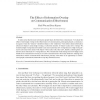Free Online Productivity Tools
i2Speak
i2Symbol
i2OCR
iTex2Img
iWeb2Print
iWeb2Shot
i2Type
iPdf2Split
iPdf2Merge
i2Bopomofo
i2Arabic
i2Style
i2Image
i2PDF
iLatex2Rtf
Sci2ools
COGSCI
2007
2007
The Effect of Information Overlap on Communication Effectiveness
It makes sense that the more information people share, the better they communicate. To evaluate the effect of knowledge overlap on the effectiveness of communication, participants played a communication game where the “director” identified objects to the “addressee.” Pairs either shared information about most objects’ names (high overlap), or about the minority of objects’ names (low overlap). We found that high-overlap directors tended to use more names than low overlap directors. High overlap directors also used more names with objects whose names only they knew, thereby confusing their addressees more often than low-overlap directors. We conclude that while sharing more knowledge can be beneficial to communication overall, it can cause communication to be locally ineffective. Sharing more information reduces communication effectiveness precisely when there is an opportunity to inform– when people communicate information only they themselves know.
Related Content
| Added | 12 Dec 2010 |
| Updated | 12 Dec 2010 |
| Type | Journal |
| Year | 2007 |
| Where | COGSCI |
| Authors | Shali Wu, Boaz Keysar |
Comments (0)

